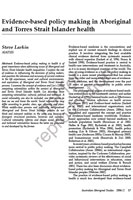Evidence-based policy making in Aboriginal and Torres Strait Islander health
Evidence-based policy making in health is of great importance when addressing issues of Aboriginal and Torres Strait Islander health inequalities. Steve Larkin explores the role of evidence in influencing the decisions of policy makers, and questions the relevance and accuracy of current evidence to the life experiences, social and cultural environments, and aspirations of Aboriginal and Torres Strait Islander persons. He examines the concept of evidence and Lin’s (2003) competing rationalities within the context of Aboriginal and Torres Strait Islander health. Lin describes three competing rationalities: cultural, political and technical. A social rationality can also be included, one that relates to how we see and know the world. Social rationalities may differ according to gender, class, age, ethnicity and place. White middle-class persons and politically marginalised Aboriginal and Torres Strait Islander peoples do not think and interpret realities in the same way because of divergent structural positions, histories and cultures. Cultural rationality informs and shapes social, political and technical rationalities because the latter are grounded in and developed by the former.
